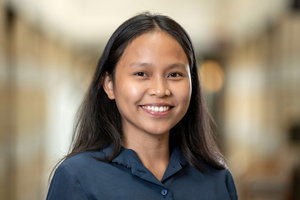 Kellogg Doctoral Student Affiliate Jeremi (Jem) Panganiban, is a Ph.D. student in Peace Studies and Anthropology, a University Presidential Fellow, and a trained anthropologist studying the intersection between peace and sustainability in maritime communities. Jem’s research grapples with the longstanding issues facing how women’s well-being impacts the environment and community vulnerability. In this Q&A, Jem discusses the importance of gender analysis frameworks in environmental research, her research challenges and goals, and where she sees herself after completing her Ph.D.
Kellogg Doctoral Student Affiliate Jeremi (Jem) Panganiban, is a Ph.D. student in Peace Studies and Anthropology, a University Presidential Fellow, and a trained anthropologist studying the intersection between peace and sustainability in maritime communities. Jem’s research grapples with the longstanding issues facing how women’s well-being impacts the environment and community vulnerability. In this Q&A, Jem discusses the importance of gender analysis frameworks in environmental research, her research challenges and goals, and where she sees herself after completing her Ph.D.
What inspired your research interest in women’s well-being, sustainability, and maritime communities?
In the Philippines, I worked at a nonprofit focused on women’s rights issues, community organizing, and community development efforts. The nonprofit exposed me to social issues facing our community and the importance of organizing and awareness. Through this experience, I encountered many women, from a variety of situations, who were trying to make the most of what they had despite all the obstacles in their way. It may seem like my work was not directly involved with peace work, but I would argue it dealt with intersections of peace, such as gender, violence against women, and socioeconomic inequality. My work eventually took me to ocean communities, where I began to interact with the environmental side of conflict and sustainability. In this new context, I started to grapple with long-standing issues of women’s well-being, the environment, damage to our ecosystem, and how this threatens marginalized communities.
Why did you decide to pursue a Ph.D., and how did you find the Kroc Institute?
I was out in the field, completing a fellowship in Hawaii on maritime lives before coming to the Kroc Institute. Once I began working with environmental leaders in Asia and communities in the Philippines, I realized that many environmental issues aligned geographically. I witnessed territorial disputes, gender dynamics, and violence in these communities, which inspired me to dedicate space to exploring how these varied factors intersect with one another in the world of peace. Once I started looking for programs, I received many recommendations for the Kroc Institute, both from my colleagues and my husband. I liked Kroc’s emphasis on theoretical teachings on gender, violence, and peace. I am an anthropologist by training, so I was intrigued by the interdisciplinary nature of Kroc and ultimately decided to work with the Institute to better expand my research. Now that I am here, I am able to study how people survive in violent environments and what the role of resilience is in maritime areas thanks to Kroc’s resources and experienced scholars.
What role do you think gender analysis plays in researching sustainability, biodiversity, and armed aggression?
Environments are fundamental connections. However, our social structures inform the way we interact with the environment, such as whether we see it as external or as the core of our collective identities. Essentially, we recognize that different communities have different ideologies, many of which are inherently gendered. To understand these ideologies, which drive sustainability approaches, armed aggression, and biodiversity safeguarding, we need to capture gender dynamics. Decisions based on gender may result in disproportionate access or lack of access to resources. Approaching these issues from a gendered lens can provide better insight, and help us answer our questions on the inequality driving these issues.
What are the biggest challenges and goals of your research?
One of the primary obstacles is the constantly changing peace situation. Once you think you are conscious of what is going on and its impact on communities, something changes, so you’re always encountering new dynamics in your research. Of course, in my specific situation, COVID was and continues to be a massive challenge in conducting research. Many of us are researching remotely and no longer enjoy the same access we once did.
For my goals, I strive to determine conflict drivers from the communities' perspective and how we can present solutions to these conflict drivers, to promote peace.
What are your next professional steps and goals?
In the long term, I hope to use new knowledge of maritime security and maritime communities professionally. I am interested in continuing to conduct research as an academic, but also to begin teaching around the world. Being able to share my knowledge and be hands-on with my work is a priority for me.
This story originally appeared at kroc.nd.edu.
The Kellogg Institute for International Studies, part of the Keough School of Global Affairs at the University of Notre Dame, is an interdisciplinary community of scholars and students from across the University and around the globe that promotes research, provides educational opportunities, and builds partnerships throughout the world on the themes of global democracy and integral human development.





